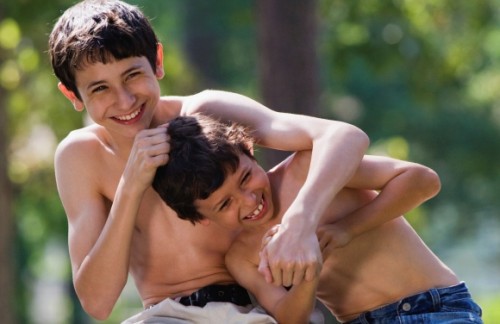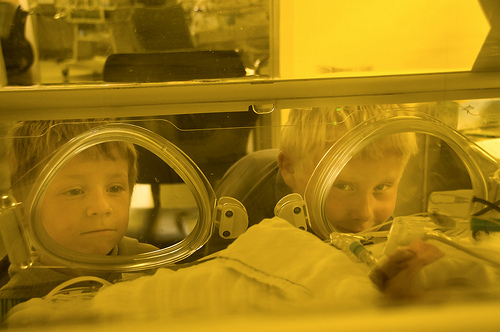Sibling Rivalry
After many years I can still picture in my mind a little nine-year-old boy standing by the isolette containing his two-week old baby brother.
His parents were speaking with the physician about surgery and he was all alone in his too-big hospital gown, small enough to look directly at eye level in on “his baby.”
I was sitting across the room, charting on a patient of mine; but because this scene touched me, I quietly watched for a moment. Although I never found out their names, I learned some parenting type lessons that I have never forgotten.
Now it wasn’t the fact that the baby was the 7th boy born to the family that caught my eye, nor was it the fact that he was born with Down’s syndrome and had a serious heart malformation.
It was the fact that his Nine-year-old brother stood there with his hand through the porthole, holding the tiny hand wrapped around his finger, with quiet tears of compassion streaming down his face!
I was told by the nurse that this was the fifth brother to take his turn holding the baby’s hand before it went to surgery.
Where were the sibling rivalries?
Hadn’t this infant displaced them? Weren’t they all in the shuffle with six other brothers? Hadn’t they lost nearly all of their parents’ time for the past two weeks?
Do siblings HAVE to rival?
I am not sure I have the answers for all of these questions, but this memory has made me very aware of sibling relationships.
I think most siblings do rival at some point in time in their lives; but, the degree and frequency may reflect a few principles and are similar to those of jealousy.
First, there is the degree to which the child is comfortable with the kind of self-image that he feels. (Remember, self image is the fictionalized picture that he thinks others see of him.)
It’s as if children were continually asking questions like “am I ok?” “Is this good enough?” “how am I doing?” “am I important?” “Do I fit in?”
If a child is unsure of the position he holds in the family, then anything that threatens that position will promote jealousy.
Second, and somewhat related, is the degree to which he has Self-assurance vs. Self-centeredness.
Self-centeredness or selfishness promotes sibling rivalry whereas self-assurance does not.
The self-centered child wants the biggest cookie, or most of the food, or the best seat, or the easiest chores; at the expense of his brothers and sisters.
A third concept is the degree to which a child is aware of social consequences and the feelings and needs of others.
Unfortunately, the most frequently used baby sitter (the TV) does little to promote this awareness and, in fact, most of the time destroys it.
Social consequences and feelings are very rarely dealt with in cartoons where significant and severe aggression rarely produce injury.
On the other hand, the old shows like Donna Reed, Leave it to Beaver, Father Knows Best and others regularly dealt with feeling type issues.
The fourth concept is overall family unity. If a child really feels like an important part of a larger organization, sibling rivalry is less.
This is largely determined by family experiences, habits, and traditions. Religious experiences play an important part as do any personal family trials that have had to be overcome.
It seems to me that the cohesive families with little sibling rivalry are those were the parents spend a great deal of time building self-image, encouraging communication, teaching social consequences and how to understand feelings and project the possible feelings of others.
Answer the “Am I OK?” type of questions mentioned above before the child even asks them. Include children at least superficially in family decisions. Spend special time with each child alone, which tells him he is meaningful to you.
Assign meaningful family responsibilities as young as you can.
And, continually ask the child feeling-type questions like “What are you feeling now?” or “you seem to be feeling jealous, is that correct?”
And encourage them to analyze the feelings of others like “How do you suppose that makes her feel?” or “How does that man look like he feels?” or “If you take this surprise to her, how do you suppose she will feel?”
Now I’m not sure whether the infant had successful surgery; but even if he didn’t, I know that he went out of this world not only clean and pure but loved and had touched at least one nine-year-olds life.


